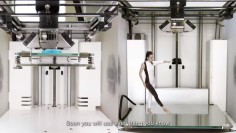michal helfman
Running out of History
32ª Bienal de São Paulo

source: 32bienalorgbr
Michal Helfman trabalha com escultura, desenho, instalação, performance, dança e filme. Para a 32a Bienal, a artista apresenta a videoinstalação Running Out of History [Esgotando a história] (2015-2016), filme ficcional com roteiro baseado em entrevistas reais da artista com a ativista israelense Gal Lusky, que criou uma organização não governamental atuante em lugares nos quais a entrada de ajuda humanitária internacional é dificultada por seus regimes políticos. O filme traz uma narrativa sobre justiça, construção histórica, arte, política e práticas ativistas. As discussões giram em torno de temas como contrabando, semelhanças e diferenças entre ativistas e artistas, figuras que podem inspirar e influenciar a realidade. As conversas são moderadas por dois dados impressos em 3D, cada face contém uma palavra da frase “Não perdoaremos, não esqueceremos” – cunhada em Israel acerca do Holocausto, mas que também serviu para legitimar atos de violência praticados por autoridades estatais. Na impressora 3D, uma dançarina se movimenta de acordo com as direções da máquina. O filme é parte de uma instalação que inclui barreiras e dispositivos, como caixas de transporte e esculturas. Dentro dela está uma escultura de chapa de metal com a imagem de uma balança, sugerindo um signo de ponderação, pesos e medidas ante a condição histórica e política tratada por Helfman.
.
.
.
.
.
.
.
source: vivreaberlin
Michal Helfman est née en 1973 à Tel-Aviv où elle a vécu et travaillé. Sa pratique de l’art est principalement axée sur la vidéo, l’architecture et le dessin. Elle a régulièrement exposé à l’international (50e Biennale de Venise, Institut des Arts visuels de San Francisco etc.), ce qui lui vaut une certaine notoriété.
Son travail interroge les relations potentielles entre le physique et le visuel, défiant en permanence la perception de l’espace et du mouvement.
Au travers de Running Out Of History, l’activiste Israëlienne Gal Lusky est entendue dans deux ensembles de dialogues aux sujets brûlants, sur fond d’images travaillées par l’artiste. Gal Lusky est une activiste israélienne, fondatrice et directrice de l’ONG Israeli Flying Aid (IFA) fournissant une aide humanitaire aux populations en situation de crise en Israël. Deux protagonistes lui donnent la répliquent et transforment les dialogues en une sorte d’interviews : Rassan, une collaboratrice Syrienne de Gal Lusky ; puis Michal Helfman elle-même.
.
.
.
.
.
.
.
source: artiscontemporaryorg
Michal Helfman will present a video-installation entitled Running out of History at the 32nd Bienal de São Paulo, Incerteza Viva (Live Uncertainty) . The fictional film is based on two sets of dialogue revolving an Israeli humanitarian aid activist named ‘G’, the founder and head of IFA, an NGO known for developing smuggling techniques in countries where local regimes prevent the entry of international aid organizations. During the last four years, the NGO has been smuggling humanitarian aid to the besieged population in Syria.
The plot unfolds as one narrative, told through dialogues between Helfman, G and Rassan, her Syrian partner. The conversation is moderated by two 3D printed dice bearing the words “We will not forget, We will not forgive.” The first dialogue is a re-enactment of a dramatic night in which G confessed to her Syrian partner about her disguised Israeli identity. The second one is an interview with Helfman where they discuss the differences between activists and artists as practices which inspire and influence reality.
An installation will be created as a variation on elements that already appear in the accompanying video work. Set elements and props will define the space, regulate the viewers’ movements, and serve as seats for people to watch the film.
.
.
.
.
.
.
.
source: kw-berlinde
RUNNING OUT OF HISTORY is a new fictional video work by Israeli artist Michal Helfman. It features two sets of dialogs that revolve around the activist G., an Israeli woman who is the founder and head of a NGO which provides humanitarian aid to populations in crisis. During the last four years the NGO has been smuggling humanitarian aid to the besieged population in Syria. The work examines the concept of “smuggling” as both a concrete activist tool and as a metaphor for the artistic act, which constantly traces alternative paths within existing orders.
The film, structured as a dialog, begins with a conversation between G. and Rassan, her Syrian collaborator, who she worked with undercover over a year and a half. It reenacts the dramatic night when G. revealed her Israeli identity to Rassan, her Syrian counterpart. The second dialog is a conversation between G. and the artist, addressing the differences between activism and art as well as the two women’s common aim of influencing reality through their work. The two have collaborated in the past with a long-term exchange of stories, discussing each other’s practices and the differences between their two disciplines. In the video, their conversation takes the form of an interview, and is present as the soundtrack.

